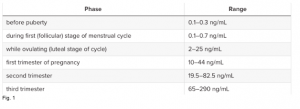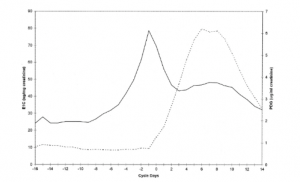

Have you ever wondered how hormone changes through menopause effects weight gain? Before jumping into tips and strategies to maintain a healthy body fat percentage , we will unpack our main sex hormones, where they are produced and their role in reproduction and menopause.
What are the main female sex hormones?
Estrogen
The majority of estrogen production occurs in the ovaries; however, it is also secreted in smaller amounts from the adrenal glands, fat cells and placenta. Estrogen levels are separated into pre-menopausal: 15-350pg/mL and post- menopausal: <10 pg/mL. Estrogens main role during puberty is the development of secondary sex characteristics in women, such as the widening of your hips, breast development, body hair production and regulation of your period. During pregnancy estrogen works with progesterone to stop ovulation and also controls lactation in nursing mothers. It also plays an important role with vitamin D and calcium in bone strength.
Progesterone
Progesterone is produced in the ovaries after ovulation occurs as well as in the placenta during pregnancy. Progesterone helps regulate your menstrual cycle, but its main function is to prepare your uterine lining for pregnancy. Your progesterone levels drop significantly after birth as the placenta is no longer contributing to it and this triggers lactation to occur. Progesterone levels vary depending on your reproductive age. You have progesterone and estrogen to thank for morning sickness and nausea during pregnancy!

Fig. 1
Testosterone
Testosterone is produced in small quantities in the adrenal glands, fat cells and ovaries. Generally, women make 1/10 th to 1/20 th the amount of testosterone as men do. Testosterone production plays a role in female sex drive, menstrual cycles and bone and muscle strength. The female body converts testosterone into hormones like estrogen but sometimes the level of testosterone is too high for the body to keep up with which leads to some level of masculinization such as facial hair development or baldness.
This imbalance in male/female sex hormones can be caused by the following: PCOS, adrenal carcinoma (a rare adrenal gland cancer), ovarian cancer and the over-use of synthetic steroids. The typical range for testosterone is between 15-70 ng/dL. Levels below this can lead to a low sex drive, issues with fertility, irregular periods and osteoporosis. Levels above 70 ng/dL can lead to acne, infertility, weight gain, PCOS and an infrequent menstrual cycle.
Luteinizing hormone (LH) and Follicle stimulating hormone (FSH)
FSH prompts the growth of an egg and triggers estrogen production. As your estrogen level increases your pituitary gland stops producing FSH and increases production of LH. This shift tells your body to release the egg from your ovary. After the egg is released the second phase begins, called the post-ovulatory. The follicle that housed that egg forms a corpus luteum which releases the progesterone your body needs for a viable pregnancy.
The progesterone prompts your endometrium to thicken and provides an embryo with nourishment until the placenta is ready to do so. If there is no pregnancy the corpus luteum shrinks and your progesterone level drops prompting your period to begin.
How do these hormones relate to weight gain?
Pre-menopause
Pre-menopause is when you are considered to be in your reproductive years (whatever they may be!) You still have periods, no matter how regular or irregular, you may have slight hormonal changes but there are no big physical changes. Estrogen, progesterone and testosterone levels all increase and decrease depending on where you are in your menstrual cycle. The image below is taken from a 2002 study on variations in reproductive and menstrual cycles. The solid line represents the estrogen level and the dotted line, progesterone. Day 0 indicates the day of ovulation, all days before 0 indicates the follicular phase and days after 0 indicate the post-ovulatory.

This fluctuation in hormone levels is healthy and normal in pre-menopausal women and it does not cause significant weight gain or change in muscle mass or bone density. Tacked onto the end of pre-menopause is peri-menopause. Perimenopause occurs years before menopause and causes symptoms such as hot flashes, irregular periods and mood swings.
During peri-menopause your overall estrogen level drops and the dips and peaks of estrogen during your menstrual cycle can be more extreme and sporadic. Despite the drop in overall estrogen level it is still possible to become pregnant. This phase can last for a few months or several years before true menopause begins.
Menopause and post-menopause
Menopause occurs when your estrogen levels drop too low to prompt the release of an egg therefore stopping your period and signally the end of your reproductive years. It is generally believed to ‘officially’ occur after you go a full year without a period. This can cause weight gain, mood swings, depression, fatigue, insomnia, hot flashes and night sweats.
Menopause can also increase cholesterol, so it is important to get regular LDL and HDL checks from your doctor. A scientific paper from the British Medical Journal measured the hormone levels in women pre and post menopause. Their findings showed a 20% decrease in estrogen concentrations post-menopause, an initial increase in FSH and LH and then a subsequent decrease and that testosterone levels dropped by as much as 60%, 5-10 years after menopause.
Sex hormones and growth hormone levels correlate positively with muscle mass therefore during menopause when you undergo a decrease in these hormones, you are more likely to experience a decrease in lean muscle mass too. Estrogen interacts with vitamin D and calcium to promote strong bones, a decrease in estrogen increases the likely hood of osteoporosis in menopausal and post-menopausal women.
The loss of ovarian function can lead to an increase in body fat as well as a
decrease in metabolism and energy expenditure regardless of your diet and exercise routine. An increase in abdominal fat is also related to the decrease in estrogen production during menopause. Because your estrogen level decreases there is a higher proportion of testosterone in your body and therefore your start to distribute fat with a more ‘male’ pattern i.e. around the middle. With regards to diet and energy intake, in a study analysed in a paper titled ‘Understanding weight gain at menopause’ (Climacteric Journal, 2012, Vol.15) it was observed that as estrogen
levels decreased, levels of orexigenic peptides decreased and levels of leptin (an appetite regulating hormone) increased. This means that you may be finding it harder to obey your hunger cues as hormone changes increase your appetite and suppress your appetite regulating hormone cues.
What can you do to maintain a healthy weight during menopause?
Menopause is not the sole contributor to weight gain for women. Demographic, social and behavioural factors must also be considered when you notice an increase in body fat. Disruptions to circadian rhythm, shift work, skipped meals, eating out and a caloric surplus all contribute to weight gain (at all stages of life, not just during menopause). Estrogen-progestin hormone therapy has shown to slightly decrease abdominal fat in post-menopausal women, but this can have varied results depending on the style of therapy – whether it is an oral tablet or a cream for
example. Aside from hormone therapy the methods to control weight gain during menopause are exactly the same as any other stage of life.
Physical activity, weight training, adherence to a healthy diet and attention to mental health and wellbeing all assist in maintain a healthy weight.
To loose excess body fat an energy deficit must be established from maintenance. Regardless of age, gender or activity levels, if scale weight plateau’s after a period of time, the individual is considered to be at maintenance and a drop in calories is needed. The energy balance equation can be off-set with an increase of muscle mass and increase in physical activity participation, but a change in nutritional intake should be the first step in this process.
Calcium + vitamin D supplements also significantly aid in maintain muscle mass and bone density after menopause (as well as the rest of your life!). Make sure you are consuming enough calcium and vitamin D. If you take a supplement it is best to take them together as the presence vitamin D increases uptake of calcium.
Menopause can also compromise your pelvic floor as your tissues become less elastic. Even though you are past child bearing years you don’t want to be stuck with incontinence for the rest of your life! Pelvic floor exercises should be performed daily to prevent incontinence during menopause.
Most importantly, maintaining and building muscle mass throughout the lifespan is critical. Weight training helps to slow down the ‘natural’ ageing process. We have all heard that weight bearing exercise helps to prevent osteoporosis by maintaining bone density. Greater lean muscle mass is also important to boost an individual’s basal metabolic rate, which metabolism and ensure excess calories are not covered to storage. A decrease in oestrogen can be off-set with more metabolically active tissue (muscle cells) as there are more sites to combust carbohydrates.
Sources
Fig 1.
https://www.healthline.com/health/female-sex-hormones#types
https://www.livescience.com/38324-what-is-estrogen.html
https://www.ncbi.nlm.nih.gov/pmc/articles/PMC1688678/
Chakravarti, S., Collins, W. P., Forecast, J. D., Newton, J. R., Oram, D. H., & Studd, J. W. (1976).
Hormonal profiles after the menopause. British medical journal, 2(6039), 784–787.
doi:10.1136/bmj.2.6039.784
https://www.tandfonline.com/doi/full/10.3109/13697137.2012.707385?src=recsys
S. R. Davis, C. Castelo-Branco, P. Chedraui, M. A. Lumsden, R. E. Nappi, D. Shah, P. Villaseca & as
the Writing Group of the International Menopause Society for World Menopause Day
2012 (2012) Understanding weight gain at menopause, Climacteric, 15:5, 419-
429, DOI: 10.3109/13697137.2012.707385

Ange Drake is an personal trainer, women’s empowerment coach and fitness blogger in the northern suburbs of Melbourne. She is the director of one of the few womens’ only strength training gyms in Melbourne, 23W. Ange helps women to learn how to use strength based training, nutritional strategies and a positive mindset to transform their bodies, relationship with food and mind.
Can’t decide which of our packages is best suited for you? Take our questionnaire to help you decide!





